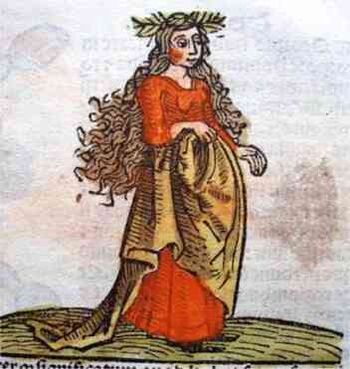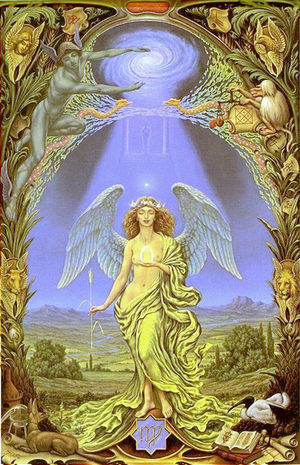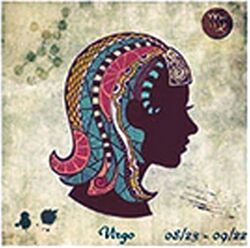Virgo

Symbol: 
Ruling Planet: Mercury
Sun in Virgo: roughly from 23rd August until 22nd September.
Tarot Key: The Hermit
Time of year: Time of maturity, shortening days, onset of bird migration
Cultural: Harvest, making provisions, Work
Area of the body: Small intestines (Abdomen)
Star constellation: Virgo
Mythology of the constellation
Liz Greene[2]: The virgin goddesses of myth were not virgins in the sexual sense. In fact they were often portrayed as sensual and promiscuous. In Latin, the word virgo means ʹunmarried' or 'self-possessed', and connotes not sexual purity but a self-sufficiency which made these deities eschew wifely roles. As mistress of herself, the virgin goddess belonged to no one, and therefore acted solely from her own will, rather than as the mouthpiece or consort of a male deity.
The goddess Astraea, whose symbolism was exploited by Queen Elizabeth I as "cosmic" propaganda during her long reign, was known to the Greeks and Romans as the patron of justice and natural law, and presided over the orderly cycles of nature. Offended by the cruelty and boorishness of the human race, she abandoned the earth and withdrew into the heavens.
Earlier "virgin" goddesses, such as the Syrio-Phoenician Atargatis, were not so refined. They presided over orgiastic rites, dispensed their favors through temple prostitutes, and personified the fertile abandonment of nature. Yet they too were virgins and gave themselves to those men or gods who pleased them, rather than to those to whom they owed a wifely duty.
The virgin goddess of nature is an ancient symbol of the inviolable integrity of the earth itself. Despite our endless rape and wastage of her natural resources, the earth preserves its mystery, power and capacity for self-renewal.
There are various myths associated with the constellation of Virgo, although powerful goddesses are a dominant theme, for example Dike, the goddess of moral righteousness, Tyche, the goddess of luck or chance and Astarea, the goddess of justice and convention who abandoned the Earth as humans became more brutal.
However, Demeter is the goddess most closely associated with the sign of Virgo. She is the Greek goddess of fertility and ruler of the seasons. She was honoured particularly towards the end of summer when the golden ears of corn were harvested. She taught men how to plough and women how to grind the grain and bake bread. She was stricken by grief after her daughter Persephone was abducted by Hades (Latin: Pluto) who was aided by Zeus, and she allowed the land to become barren. Zeus feared that humanity might not survive and that nobody would be left to bring him sacrifices. He therefore made a bargain with Hades for the release of Persephone. However, when journeying back to her mother, Persephone ate a few Pomegranate seeds, the symbol of marriage and was therefore bound to Hades. Demeter had to accept sharing Persephone with Hades, and that barrenness is also an aspect of fertility. From that time forth, Persephone spent one third of the year with Hades and two thirds with her mother.
Interpretation
Virgo is the sixth sign of the zodiac. It is concerned with evaluating and utilising. Virgo is passionately devoted to details and is a keen observer of the small things, including those others might consider insignificant. Virgoans are very conscientious in everything they do and excel at creating order. They can be of service to a cause or an individual. The word service often gives rise to negative associations when in actual fact there are few individuals who do not serve in some way or another. Therefore, and because the term Virgo is associated with sexual abstinence, the sign of Virgo often has a rather bad reputation.
Typical Virgo associations are in fact misleading. According to the psychoanalyst and astrologer Liz Greene, the mythological virgin is "the archetypal image of the free woman who is first and foremost espoused to her innermost self and only secondly to a man". In this case, the prime emphasis is being true to oneself rather than carrying out the wishes of others. Virgo is especially capable of adapting to circumstances and making the best of them.
Virgo makes use of the Earth's fertility in preparation for the barren times ahead, thus taking on an important duty for the wider community - at the same time modest and aware of how indispensable this service is. She doesn't feel the need to be the centre of attention.
She may occasionally find it hard to see the wood for the trees. If this happens, she can lose herself in the details and have difficulty understanding different points of view. She can be fussy, sterile and small-minded and can be in danger of serving the needs of others while ignoring the latent inner aspects of her own life. The myth of Hades and Persephone shows that both aspects belong together.
Those born under the sign of Virgo also have healing qualities. They are very aware of the relationship between nutrition and health.
The sign of Virgo imparts the qualities of adaptability, common sense and caution to any planets or axes which are placed in this sign.
The sign of Virgo shares with its polar opposite sign Pisces the character trait of being devoted to the wider community. Virgo is dedicated to material needs whereas Pisces is devoted to spiritual ones. Virgo, along with the other two Earth signs Taurus and Capricorn, is orientated towards the physical realm. Taurus' approach is through pleasure, Virgo uses the body in order to understand physical health, and Capricorn makes use of the body to fulfil its life's task. Virgo can learn valuable lessons from the two signs squaring it. From Gemini the ability to take on several things at a time, and from Sagittarius the ability to use visions as a source of inspiration.
Virgo is the sign of fall for Jupiter and Neptune.
See also
Weblinks
- Virgo the Maiden (Deborah Houlding, Skyscript)
- The Zodiac Suite: "Virgo" by Rebecca Tripp (youTube - Video)
- Sound of zodiac - Virgo (youTube - Video)

